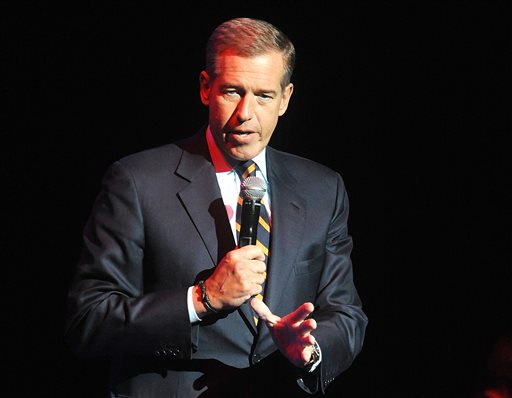When the newscaster is the news

Photo by Brad Barket/Invision/AP, File
FILE – In this Nov. 5, 2014 file photo, Brian Williams speaks at the 8th Annual Stand Up For Heroes, presented by New York Comedy Festival and The Bob Woodruff Foundation in New York. NBC says it is suspending Brian Williams as “Nightly News” anchor and managing editor for six months without pay for misleading the public about his experiences covering the Iraq War. NBC chief executive Steve Burke said Tuesday, Feb. 10, 2015, that Williams’ actions were inexcusable and jeopardized the trust he has built up with viewers during his decade as the network’s lead anchor. (Photo by Brad Barket/Invision/AP, File)
February 11, 2015
Each day, newscasters are charged with the task of reporting daily events, some significant and some menial, to the general public. Viewers often take their thoughts and words on world happenings to be truthful and informative. However, receiving negative publicity on the news is a sure way to deteriorate the trust between a newscaster and the public—a concept most do not think of when picturing the familiar faces of a local news station.
Having trust from the public ultimately provides the foundation for a newscaster’s job. Without trust in a newscaster, there is no career available for them.
Brian Williams, a newscaster on NBC Nightly News since 2004, announced that he will be temporarily leaving the news desk due to his recent publicity on the news.
The validity of his news coverages has been called into question. He claimed that during Hurricane Katrina his hotel flooded, and he saw a dead body float by. Then, supposedly, while covering the war in Iraq, his helicopter was shot at at one point.
The longtime anchor no longer has a leg to stand on, for his entire career is now being scrutinized by everyone. Williams even said himself that he has become a “distracting news story”.
NBC released a personal statement from Williams saying, “In the midst of a career spent covering and consuming news, it has become painfully apparent to me that I am presently too much a part of the news, due to my actions.”
All the trust Williams had from viewers is now lost. He is hopeful that he will one day return to the desk, for he said “Upon my return, I will continue my career-long effort to be worthy of the trust of those who place their trust in us.”
It will take a long time for Williams to gain trust back, if he does at all.
Trust withers away not only between the anchor and the viewers, but also between the news station and the viewers. As a viewer, it’s logical to question the legitimacy of a station that backs up an unreliable journalist.
The whole station, as it tries to clear the negative publicity, is placed under a microscope and carefully examined by the public. The situation makes one wonder – if one newscaster exaggerates the truth, does anyone else?
This turn of events just goes to show what could happen when a newscaster becomes part of the news himself. Trust is a fragile concept, especially in journalism. Once trust is broken, the relationship between the newscaster, the station, and the public can be smoothed over, but it’s never going to be the same again.









